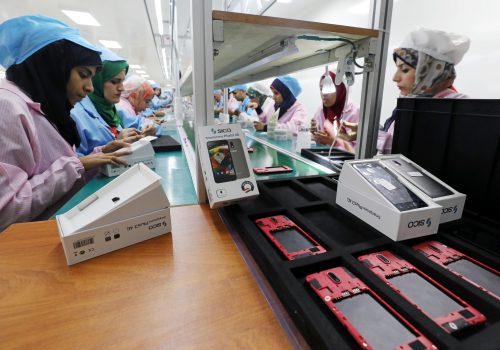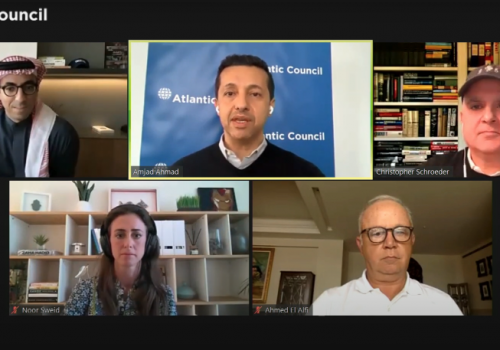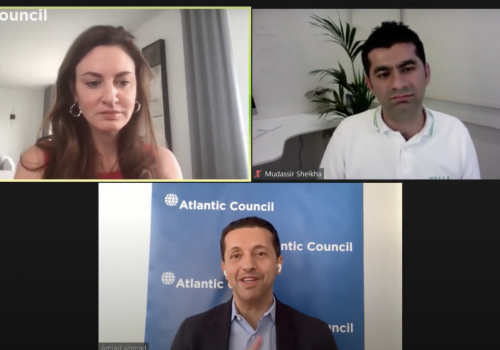Senior State Department official says US is committed to supporting entrepreneurship in the Middle East
Key Takeaway: The Biden administration is committed to supporting entrepreneurship in the Middle East and deepening economic cooperation between the United States and the region, according to US Department of State Bureau of Near Eastern Affairs Acting Assistant Secretary Joey Hood.
On February 24, the Atlantic Council’s empowerME hosted Hood for a conversation moderated by empowerME Director Amjad Ahmad about US economic development priorities in the Middle East. Hood elaborated on entrepreneurship and innovation, how to economically empower youth, women, and marginalized communities, as well as the challenges and opportunities the pandemic and climate change have introduced. Below is a summary of his key points.
Entrepreneurship and innovation
- US policy should focus on economic cooperation: Hood agreed with Ahmad that US policy in the region should move beyond security partnerships to prioritize economic ties. Given the perceived decline in the future value of the Gulf’s oil resources, “a broader, more diverse set of relationships with Gulf countries” will benefit US interests, according to Hood.
- Encouraging US investment in MENA: With support from the US State Department and Department of Commerce, Hood would like to see more American companies, especially small- to medium-sized enterprises (SMEs), establishing business relationships in the Middle East given that connections can be made more quickly now with telework.
- Private-sector job creation: Hood attested that “the region’s future social and political stability” depends on the estimated three hundred million new jobs that will be needed in the region by 2050. And going beyond the traditional path of government employment is critical: “We need to look to entrepreneurs to start SMEs to create those jobs.”
- Trust between governments and citizens: In addition to economic prosperity and socioeconomic development, Hood argued that trust is “one of the biggest missing pieces for stability in the Middle East.” Governments must earn their citizens’ trust by “making every effort to provide economic opportunities for all.” In turn, governments must trust the private sector “and unleash it as an engine for job creation and growth rather than a tool for patronage.”
- Recommendations for regional policy makers: Hood urged governments to cut red tape, develop more business-friendly investment laws, improve insolvency reform, and support contract enforcement, public procurement practices, and intellectual property rights (IPR) protections. He stressed that “we need to see a change because IPR protections are essential to knowledge-based economies.”
Empowering youth, women, and marginalized communities
- People-to-people connections: Hood advocated for unleashing creativity and innovation by connecting aspiring entrepreneurs and government leaders from the Middle East and North Africa with their American counterparts to learn from their success stories and then apply those lessons back home. He argued that youth exchanges and study abroad opportunities are a critical form of US soft power and foster close business relationships.
- Women’s participation in the workforce: Noting that Egypt’s GDP could be 29 percent higher, the UAE’s could be 31 percent higher, and Lebanon’s could be 28 percent higher with the elimination of the economic gender gap, Hood underscored the importance of harnessing the talent of working-age women as part of the region’s post-COVID-19 economic recovery. He highlighted two of the State Department’s projects with the American University in Beirut: the Middle East Partnership Initiative’s Knowledge is Power Index and the Support and Accelerate Women’s Inclusion in the Workforce project.
- Cultural shifts to foster innovation: Hood expressed his hope that parents will support young people’s growing interest in entrepreneurship and in private-sector jobs, even with the associated financial risks: Failure is “absolutely essential to an ecosystem that rewards entrepreneurship, because without failure there really is no entrepreneurship.”
Challenges and opportunities introduced by the pandemic and climate change
- International cooperation on tackling COVID-19: While Hood emphasized that the Biden administration’s top priority is fighting the pandemic at home, he also acknowledged that coronavirus strains and mutations throughout the world pose a national security threat to the US. As a result, the US government has pledged to provide two $2 billion contributions to COVAX and work with other nations to scale up vaccine manufacturing, supplies, and distribution.
- New jobs to tackle climate change: Hood shared his optimism about American and Middle Eastern businesses partnering to transition away from fossil fuels, build a knowledge-based economy in the region, and maximize contributions to Paris Agreement goals. He pointed to the solar and technology sectors as being particularly promising for economic diversification and job creation in the Middle East.
China’s role in the region and the US plan to counter their growing influence
- China’s success is stolen: Hood pushed back on perceptions that China’s soft power is growing and that they are innovating, saying: “We know that they [China] have a major commercial espionage program and we know that a lot of the innovations that they’ve supposedly made have actually been stolen from businesses in Europe and the United States.”
- The United States remains more appealing than China: Hood noted that the average young person in the Middle East is far more likely to dream of studying or working in the US than in China. Hood characterized China by its policies of “shutting down access to the internet” and “political oppression.”
- The United States is a more reliable partner: Hood accused China of using “economic coercion” and “debt trap diplomacy” in foreign relations. In contrast, he said the US is “not a fair-weather friend” and has a track record in the region of supporting partners in their time of need, as the upcoming thirtieth anniversary of the liberation of Kuwait should remind us. The US, not China, led a coalition to liberate Kuwait, remarked Hood.
Allison Holle is a program assistant at the Atlantic Council’s Rafik Hariri Center for the Middle East & Middle East Initiatives. Follow her @AllisonHolle.


